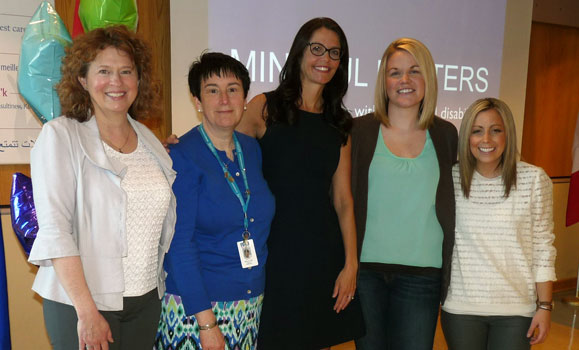News
» Go to news mainNursing video is changing the way health professionals treat children with intellectual disabilities
Watch - Mindful Matters: Caring for Children with Intellectual Disabilities.
Video has become a learning tool that does what books cannot: visually conveying emotion to educate students and professionals for job-specific scenarios. Mindful Matters, a video created by Sheri Price and Megan Aston of Dalhousie’s School of Nursing was launched at the IWK Children’s Hospital on May 9th 2016.
The video aims to inform students, faculty and staff that attentive actions towards intellectually disabled children and their families can improve the quality of care for everyone involved.
A qualitative study conducted at the IWK four years ago indicated that children with intellectual disabilities and their families were not having optimal hospital visits due to stigma and stereotypes which negatively impacted their relationships with healthcare providers.
“These research findings found that there is a need for training around how to communicate, and how to establish a relationship with intellectually disabled children and their families,” says Price.
Creating a visual story
“We sought funding to explore how we could bring this issue to life using innovative knowledge translation strategies.”
Drs. Aston and Price received funding from NSHRF to develop a video to reach a wide audience that would be both reflective of their research and responsive to the participants’ experiences.
The video portrays the experiences of two real families and their children who have intellectual disabilities. In it, the families talk about tackling stereotyping and labels, as well as the importance of building relationships with healthcare providers.
“Individuals viewing the video can gain an understanding of our research findings and also gain knowledge on how they can engage more positively with children living with intellectual disabilities.” says Price.
The video is available on Youtube and has been widely shared on social media. Drs. Aston and Price also wanted to make sure that it was being seen by healthcare providers, so they’ve turned the video into a teaching tool. Students from across the Faculty of Health Professions – in fields such as physiotherapy, human communication disorders, and nursing – will have the opportunity to participate in a workshop and view the video as part of their studies.
“It’s not a lecture but it is an engaging piece that seems to be pulling at everyone’s heartstrings,” says Aston. “It is very powerful.”
Stereotypes and Stigma
‘Intellectually disabled’ is a diagnosis, but not a very descriptive one. Individual patients can have a wide variety of characteristics or abilities, but if a doctor or nurse just sees ‘intellectually disabled’ on a chart, it does not give them a clear image of who the patient really is.
“The stereotypes and stigma cause people to be concerned and nervous and they don’t know how to interact with children with this diagnosis,” says Aston.
“Children always talk about how excited they are coming to the IWK, but when we talked to their mothers or nurses they referenced struggles that would often happen due to social stereotypes.”
When presenting the video, Aston and Price ask students to talk about what they think ‘intellectually disabled’ means. They create a safe space where people can talk about the stereotypes and break them down.
Aston summarizes the best way to interact with a child and their family: “Talking to the parent second, and the child first. Making eye contact and finding the best strategies to communicate with the child - especially when they are non-verbal.”

The importance of building relationships
For children having to visit the hospital regularly, it is important that they have positive experiences, because children with intellectual disabilities will grow to be adults with intellectual disabilities advocating for themselves.
“For individuals living with a condition that is chronic or life-long, such as intellectual disabilities, they are going to have to access the health care system more frequently than others, even if they are healthy,” says Price.
As a teaching tool, Mindful Matters is addressing ways healthcare professionals can be communicating with one another, and sharing information in new ways in order to strengthen relationships with patients.
“For example, if a health professional knows that a child is really responsive to a favorite colour, or favorite toy, this information can be shared among practitioners to best enable us to build positive relationships and work collaboratively towards coordinating care,” says Price.
Next Steps for Mindful Matters
Drs. Aston and Price continue to share their video and bring awareness to this issue within the Dal and IWK community. In 2017, they will bring their workshop to a public audience through a viewing at the Halifax Central Library.
Recent News
- Nursing student closer to living out her dream of helping people thanks to support of new award
- Master of Nursing grad passionate about working in mental health and addictions
- MSc Audiology grad shifts career from entomologist to audiologist
- Occupational Science grad exploring concept of care farming
- Dal Crossroads continues 20 year legacy of student ‑led learning
- Halifax celebrating the first International Day of Play with free events
- Congratulations Dal Health Class of 2024!
- MSc Physiotherapy grad finds fulfillment in helping patients return to activities they love
